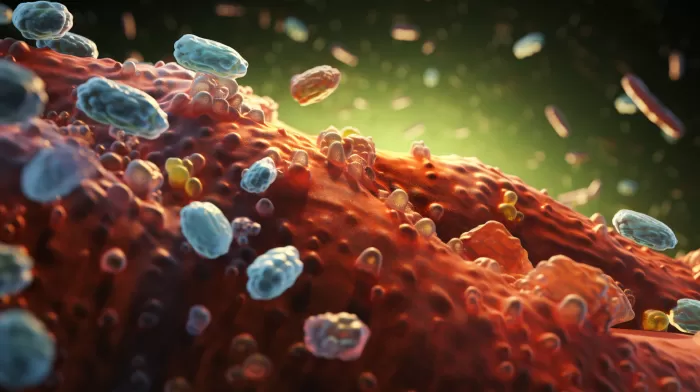Gut inflammation has long been suspected of increasing cancer risk, and a recent study published in the journal Science provides more evidence to support this connection. Not only does inflammation put you at risk for cancer, but it also disrupts the microbial communities residing in your digestive tract. This disruption allows harmful pathogens like E. coli to invade, establish a strong foothold, and further increase cancer risk. In this article, we explore these findings, their implications for human health, and potential approaches to cancer prevention.
Gut Inflammation and Disrupted Microbial Communities
Inflammation can wreak havoc on your body, and your gut is no exception. The probiotic microbial communities living in your digestive tract play crucial roles in maintaining overall health, with responsibilities ranging from digestion and nutrient absorption to immune system regulation. A healthy balance of these “good” bacteria not only promotes digestive health but also helps to keep harmful pathogens at bay.
However, inflammation can disturb this delicate balance, causing disruption to the flourishing microbial ecosystem. The experiments conducted revealed that harmful bacteria like E. coli could then easily invade and establish a strong presence, leading to new problems for the host organism. The more inflammation, the higher the likelihood of creating an environment that nurtures the growth of these harmful bacteria.
E. coli and Cancer: Uncovering a Link
During their lab experiments on animals, the researchers found that the presence of E. coli promoted tumor formation. Further investigation revealed a connection between increased cancer rates and specific parts of the E. coli genes. When these regions, known to be involved in DNA damage, were removed from the E. coli genome, the ability of the bacteria to cause tumors substantially decreased.
The researchers noted that these findings may have significant implications for human health. They found an E. coli variant with the suspect genes in high percentages of people with colorectal cancer and irritable bowel disease.
This discovery led Anthony Fodor, an associate professor of bioinformatics at the University of North Carolina, Charlotte, to remark, “These are exciting results because they suggest there may be a direct link between changes in the gut microbiome and the progression from inflammation to cancer.” Fodor is also a co-author of the study and a member of the National Institute of Health’s Human Microbiome Project Consortium.
Towards Personalized Cancer Prevention Strategies
Understanding the pathways by which pathogens like E. coli damage host cells within the context of host inflammation could open up a world of possibilities for creating personalized approaches to cancer prevention. The idea would be to target specific pathogenic taxa or genes in vulnerable human sub-populations, potentially reducing their cancer risk.
One way to help maintain a healthy balance of bacteria in your gut is to consume probiotics regularly. Probiotics are live bacteria and yeasts that offer numerous health benefits when consumed. They can be found in fermented foods like yogurt, sauerkraut, and kefir, or taken as dietary supplements.
Additionally, prebiotics, which are non-digestible food ingredients that provide fuel for probiotic bacteria, can also be obtained through food sources like asparagus, garlic, onion, and whole grains. Including both probiotics and prebiotics in your daily diet contributes to a healthy gut microbiome. This, in turn, supports a strong immune system and a lower risk of disease.
Reducing stress, getting regular exercise, and avoiding the overuse of antibiotics can also help to maintain a healthy gut microbiome and decrease inflammation. While further research is needed to fully understand the relationship between gut inflammation, microbial disruption, and cancer risk, it’s clear that taking better care of your gut—by reducing inflammation and maintaining a healthy balance of good bacteria—can be an important step in preventing the onset of cancer.
Final Thoughts
The link between gut inflammation, disrupted microbial communities, and increased cancer risk is becoming increasingly clear. As scientists continue to unravel the complex relationships between inflammation, E. coli genes, and tumor formation, we can better understand how to address and prevent cancer by focusing on gut health.
Ensuring a healthy gut microbiome through diet and lifestyle choices can reduce inflammation, promote immune system function, and minimize the risk of developing cancer. While the connection between gut health and cancer prevention is still being explored, it’s clear that prioritizing gut health and reducing inflammation should be an essential consideration in our overall well-being.



